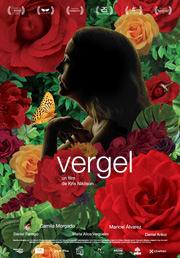Notas del director
Español
Vergel es un intento de entender la muerte. Mi muerte, otras muertes, las muertes internas a las que nos lleva la desaparición física de un ser querido. Y querer entender la muerte, me llevó a la compleja tarea de intentar entender la vida. La vida, que puede ser un simple nacer, respirar, desarrollarse, procrear, evolucionar y morir; o el tiempo que duran las cosas; o la búsqueda de autonomía, libertad y belleza, según decía Aristóteles.
En todo caso, vida siempre es naturaleza, de modo que inconscientemente comencé a construir la película con los componentes mas esenciales de la vida/naturaleza: El mundo vegetal, fuente de oxígeno; el mundo animal, símbolo de instinto; la luz del sol, primera fuente de energía; el agua, esencial para la supervivencia y el tiempo, a lo que todo lo anterior está sometido.
Al querer hablar de muerte me encontré entonces hablando de vida y al tener que hablar de vida, me descubrí hablando de naturaleza. Y como hablar de naturaleza sin hablar de belleza, si es en la primera que encontramos el referente de la segunda?
Vergel se convirtió entonces en una búsqueda, artística, filosófica, física, metafísica, técnica, desesperada, por belleza. Por esa belleza que se esconde en la fealdad, por la luz que incide en la oscuridad, por los espacios que se abren en el encierro… Por la vida que brota de la muerte.
English
Vergel is an attempt to understand death. My death, other deaths, the internal deaths that comes from the physical disappearance of a loved one. And wanting to understand death, led me to the complex task of trying to understand life. Life, which can be a simple birth, breathe, develop, procreate, evolve and die; Or how long things last; Or the search for autonomy, freedom and beauty, according to Aristotle.
In any case, life is always nature, so unconsciously, I began to construct the film with the most essential components of life / nature: The plant world, source of oxygen; The animal world, symbol of instinct; Sunlight, first source of energy; Water, essential for survival; Time, to which all the above is submitted.
When I wanted to talk about death, I found myself talking about life and having to talk about life, I found myself talking about nature. And how to speak of nature without speaking of beauty, if it is in the first that we find the referent of the second?
Vergel then became an artistic, philosophical, physical, metaphysical, technical, desperate, search for beauty. For that beauty that is hidden in the ugliness, for the light that breaks in the darkness, for the spaces that open up in the closure ... For the life that springs from death.
Portugês
Vergel é uma tentativa de entender a morte. Minha morte, outras mortes, as mortes internas às quais nos levam o desaparecimento físico de um ser querido. E querer entender a morte me levou à complexa tarefa de tentar entender a vida. A vida, que pode ser um simples nascer, respirar, desenvolver-se, procriar, evoluir e morrer; ou o tempo que duram as coisas; ou a busca de autonomia, liberdade e beleza, segundo dizia Aristóteles.
Em todo caso, vida sempre é natureza, de modo que inconscientemente comecei a construir o filme com os componentes mais essenciais da vida/natureza: O mundo vegetal, fonte de oxigênio; o mundo animal, símbolo de instinto; a luz do sol, primeira fonte de energia; a água, essencial para a sobrevivência e o tempo, ao que todo o anterior está submetido.
Ao querer falar de morte me encontrei então falando de vida e ao ter que falar de vida, me descobri falando de natureza. E como falar de natureza sem falar de beleza, se é na primeira que encontramos a referência da segunda?
Vergel se converteu então em uma busca artística, filosófica, física, metafísica, técnica, desesperada, por beleza. Por essa beleza que se esconde na feiura, pela luz que incide na escuridão, pelos espaços que se abrem na reclusão… Pela vida que brota da morte.
